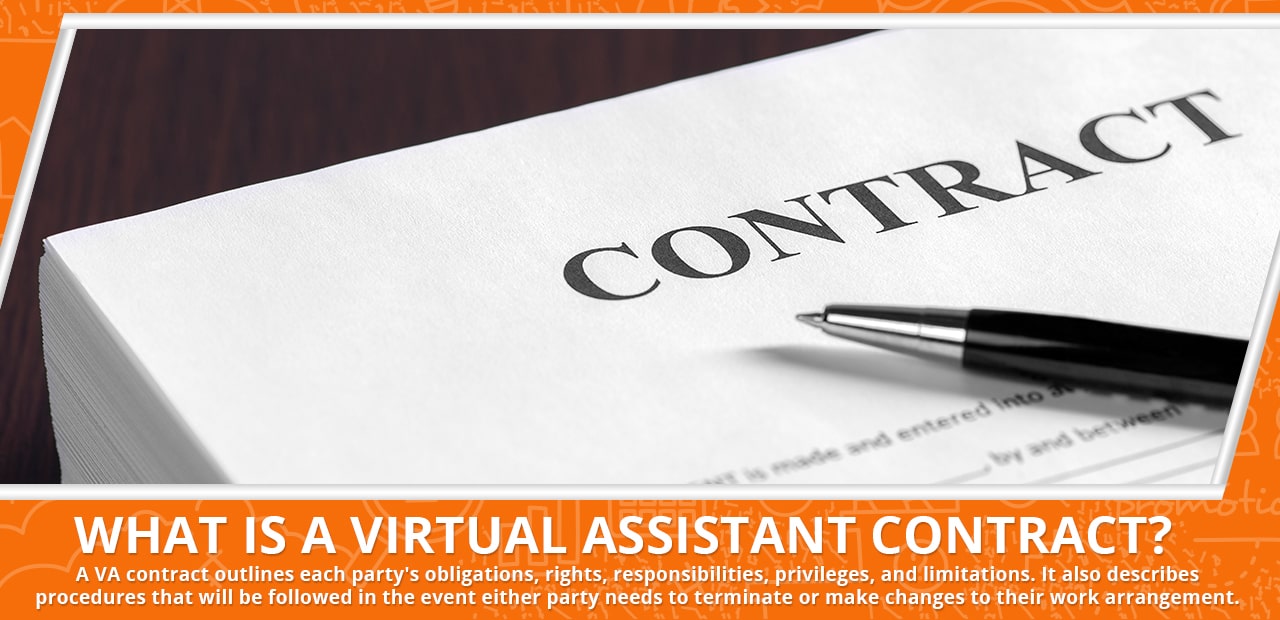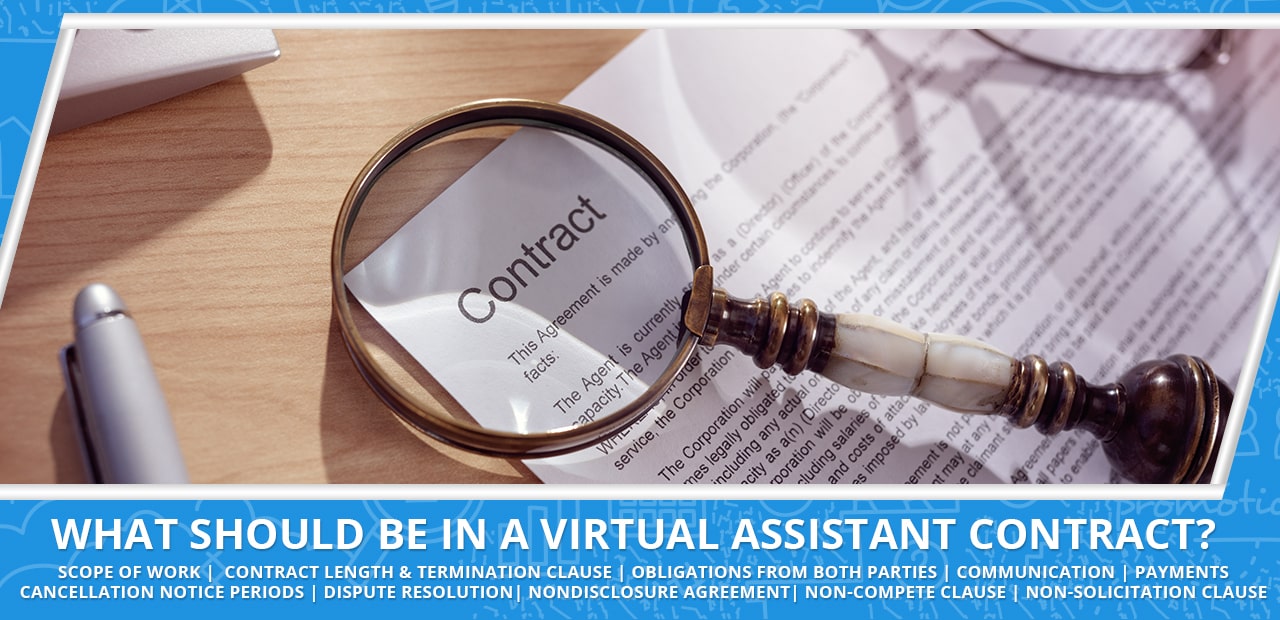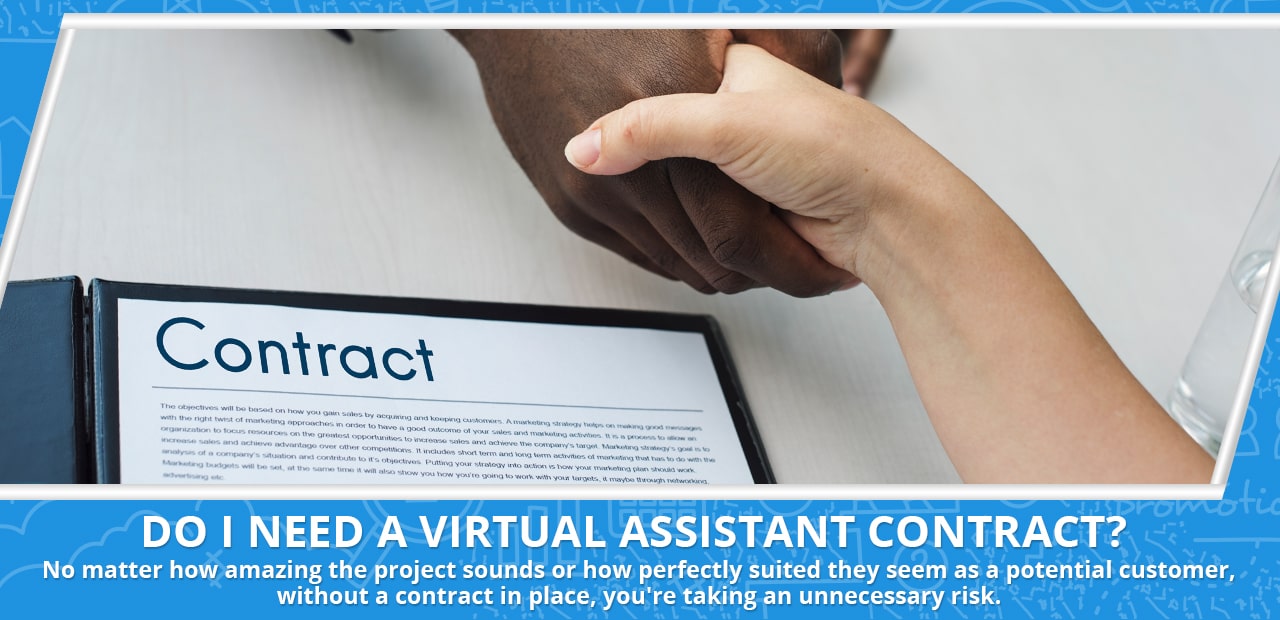Virtual Assistant Contract: Why You Need One (Plus A Free Template!)

Many virtual assistants (VAs) are first-time entrepreneurs, and as a result, they often forget to treat the client-VA relationship as a business transaction, one that requires a virtual assistant contract. As such, it’s very common for VAs and clients to enter into agreements without deciding on specifics such as:
- how many hours a week the VA will work
- the specific scope of the VA’s work
- when the VA is available for audio or video calls and when the client expects the VA to be online for discussions and check-ins
If you don’t include important details such as these in your contract, then there’s nothing stopping either party from taking liberties that favor their interests. This, of course, is not good business practice.
Whether you’re about to take on your first role as a virtual assistant or have been doing this for many years, you need to make sure that every business transaction is as straightforward and painless as possible. A virtual assistant contract provides a framework for doing business and keeping both parties accountable to the terms of their agreement.
In this post, we’ll take you through the benefits of having a virtual assistant contract and how to incorporate your specific needs into the agreement so that both parties know what’s expected from each other. Let’s get started!

What is a virtual assistant contract?
A virtual assistant contract is an agreement of conduct between a virtual assistant and the virtual assistant’s client. It defines what that VA will do and how they’ll do it and establishes rules to follow throughout the relationship.
A VA contract outlines each party’s obligations, rights, responsibilities, privileges, and limitations. It also describes procedures that will be followed in the event either party needs to terminate or make changes to their work arrangement.
Having a virtual assistant contract allows you to avoid and correct any possible misunderstanding about:
- working hours
- deliverables
- requirements for virtual assistant availability and communication
- penalties for late or unfinished work
- incentives
- payments
- data security
- ownership of intellectual property
- confidentiality
- and other necessities
For first-time VAs, having a virtual assistant contract eases the stress that can come from being new to the industry. It’s one less thing to worry about because you and your client have clearly defined what is expected. And if by chance there are misunderstandings, it gives both parties the legal protection they need to feel secure with their work arrangement. It ensures that both parties are on the same page, so to speak.
What are the benefits of using a VA contract?
Contracts are legally binding agreements, which means that both parties must adhere to them and their contents. They’re essential for virtual assistants because they protect the VA from misunderstandings and dishonest clients.
First-time virtual assistants may not realize that they need a contract. However, a virtual assistant contract is essential for first-time VAs because it will serve as a business foundation. It ensures that both the virtual assistant and the client have mutual obligations.
In general, VAs can improve the efficiency of operations because they’re able to work from any location with internet access. But for clients to take full advantage of VA services, someone needs to be accountable for specific tasks and deliverables related to these tasks. This accountability will depend on the terms agreed upon in a virtual assistant contract; thus, it’s important that you review your virtual business framework.
A virtual contract agreement, which provides that framework, also benefits VAs by:
- ensuring that clients respect and pay them for their work,
- enabling them to set boundaries and provide structure to the client relationship,
- protecting them from potential disputes, complaints, and legal issues
Let’s discuss these three benefits in more detail.
1. Ensures that clients respect and pay for the virtual assistant’s work
A virtual contract is one of the most powerful tools VAs have for making sure their clients respect and pay for their work. They create a professional atmosphere almost immediately when established, which is ideal for VAs because it allows them to stay focused on the task at hand. A contract also reinforces the idea that both parties must adhere to agreed-upon terms and services (e.g., deliverables and work hours).
The document provides a framework in which to discuss how work will be conducted. It sets expectations and rules for both parties, which can help reduce confusion, frustration, or even conflict down the road. VAs have the opportunity to present their expectations about what’s involved in doing the job they were hired to do. Then, together with their clients, they can better define those expectations within the contract.
Looking for virtual assistant work? Check out our latest open jobs
2. Enables virtual assistants to set boundaries and provide structure to the client relationship
Because a contract sets parameters around the VA’s workload and deliverables, each party knows what to expect from the other. It gives VAs the right (and responsibility) to say no if they’re unable to do something or don’t feel comfortable doing it, without fear of reprisal from their clients.
A well-written contract will also define parameters that may directly influence how a VA performs the required tasks. For example, a client may expect a VA to travel outside her hometown for meetings or events related to her work. If this is not specified in the contract, there could be confusion about whether or not this is expected behavior. By setting clear guidelines ahead of time, both parties will know what to expect if this situation arises.
3. Protects virtual assistants from potential disputes, complaints, and legal issues
A legally binding contract helps clients understand what they’re paying for. A typical VA service may include a range of responsibilities, including research, editing, social media management, email correspondence, and customer support. Clarifying specific job duties in the agreement allows both parties to agree on what it is that the virtual assistant will be doing.
With solid legal wording, you can help protect your business against potential disputes or complaints. Without some type of contract, you could end up facing an angry ex-client who believes they’re owed money for services that did not meet expectations. However, if you have a contract, it’s much easier to prove that the services provided did indeed meet the specifications and should be paid for.
A contract also protects your business by documenting that agreements have been reached between you and your client. This means that if either party fails to meet contractual obligations, there’s a strong measure of recourse through documentation that supports your position. The contract may allow a warning before legal action is taken (e.g., non-payment), giving the offending party one last chance to correct the situation.

What should be in a virtual assistant contract?
The contract should include essential elements such as the scope of the VA’s work, deadlines, compensation (including payment schedules), incentives, ownership, intellectual property, confidentiality, termination, data security, penalties, protection from liability, non-compete clause, and dispute resolution, among other things.
Let’s take a closer look at some of these essential VA contract elements.
Scope of work
In a virtual assistant contract, both parties should agree on the specific set of tasks and deliverables that the virtual assistant will be responsible for. It’s helpful to create a virtual task list or map that includes all of the tasks that need to be done in order to provide a certain service during the contract term.
Consider including timeframes for each task or project in your virtual assistant contract. It’s not a good idea to have vague deliverables that are open-ended (e.g., “client needs will be met”). Instead, it’s important to have due dates that are realistic and give both parties time to accomplish their tasks in a timely and productive manner. It can also be helpful if you include milestones or markers for the specific tasks (i.e., when Virtual Assistant A must create the monthly newsletter in order for client Z to see it).
Contract length and termination clause
Your virtual assistant contract should include details on how long the contract will last (i.e., start date and end date) plus information on what happens if either party wants to end it before the stated terms are finished.
Obligations from both parties
A virtual assistant contract must include obligations from both parties regarding how they will participate in each other’s success. Make sure that these items are clearly stated so there’s no confusion later on as to whether or not something was completed satisfactorily by either party or what is expected during a particular timeframe.
Some virtual assistant contracts state that a VA must be available for a certain number of hours every day or week. It may also include details about weekly meetings with the client or monthly all-hands meetings with the client’s entire staff.
The contract must indicate that the client will reimburse you for out-of-pocket expenses that you incur while working. For instance, this may include the cost of any items you need to complete a task, especially if the item is not included in your standard equipment. This may also include roaming charges if you use your own phone for work purposes. You’ll want to clarify all charges with any client beforehand, though, before you charge them for it on your expense form.
Limitations on the use of virtual assistant services also need to be set out clearly. For example, can virtual assistants subcontract their work? If so, who has responsibility if things go wrong? Does the virtual assistant have authority to negotiate agreements with suppliers providing input/output data to the employer without advance approval?
Communication
As a professional service provider working remotely, communication is one of the most important things you’ll need to be good at. To avoid misunderstandings, include communication methods, schedules, and boundaries in your contract. For instance, when will you be available for calls with your client? What is the best way for your client to send you new tasks or ask for progress reports? Set expectations by including a response time and working hours, and make sure client inquiries are answered during them unless an urgent reply is required.
Ready for remote work? Take our Work from Home Readiness Quiz!
Payments
A virtual assistant contract must indicate your rate, how and when you will receive payments, any applicable taxes, and penalties for late or missed payments. It should also describe what will happen if the client fails to pay you on the agreed-upon schedule.
The rate in your virtual assistant contract should include any minimum number of hours you expect to work per week, overtime and weekend rates, as well as any additional services or responsibilities clearly outlined in the contract. Payments should also include expenses incurred on behalf of the employer.
If, after signing the contract, the client’s needs change to require more time and tasks than originally discussed, it’s your responsibility to renegotiate a new rate. Incentives such as bonuses and profit-sharing agreements are possible but should be negotiated upfront before signing the agreement.
Cancellation of virtual assistant service
Your contract must indicate how you and your client will handle contract cancellation. If a client changes their mind after signing an agreement, it’s your responsibility to honor their decision, unless, of course, that decision is made based on false information.
Cancellation notices give employers time to find replacements and reduce stress on both parties. The notice period is how much time a client or VA should give after they decide to cancel a contract. The ideal cancellation clause asks for 30 days prior written notice. If this is not possible, you can agree on a shorter period.
Dispute resolution
Dispute resolution clauses are there to help you resolve any disagreements with your client before they snowball into something bigger. Some of the issues these clauses cover are disputed invoices, late payments, unsatisfactory work output, and the like.
Nondisclosure agreement
Nondisclosure agreements (NDAs) protect the client’s confidential information from being revealed to the public or other companies. These are particularly important when clients have a patent on their idea. Before sharing it with anyone, they need proof that you won’t disclose any of the information to another person without prior permission.
Non-compete clause
The non-compete clause is a contract provision that prevents the virtual assistant from setting up an identical business competing with the client in any region the client specifies. In this sense, non-compete clauses also protect the client’s intellectual property (IP) rights.
Non-solicitation clause
A non-solicitation clause is a provision in the contract that prevents the VA from soliciting the client’s employees or clients for her own business. Non-solicitation clauses can be used to protect the client’s confidential information and employee relationships, as well.

Do I need a virtual assistant contract?
The importance of VA contracts is often overlooked. Some virtual assistants believe that contracts are optional and only meant for companies with several VAs or business owners who have a large virtual assistant team at their command.
If you’re a first-time virtual assistant, it’s important to create and use a contract for every client you work for. Even if your client doesn’t require that you have one, have one! You’ll be much more likely to get paid for services completed if you have a signed copy of an agreement between you and your client that specifies what’s expected from both parties. No matter how amazing the project sounds or how perfectly suited they seem as a potential customer, without a contract in place, you’re taking an unnecessary risk.
It’s easy to think, “Oh, I know this person. They’re nice, and we’ve been emailing back and forth for weeks now. They’ll pay me; they really will.” However, until the two of you have a signed contract in place that binds both parties to payment or other requirements for completing services, your client is under no obligation to pay you.
In fact, they could disappear and refuse to pay you for your time, and there’s nothing you can do about it. Even if you’ve been emailing back and forth with them for months or even years, that doesn’t mean that they’ll continue to be responsive. It also doesn’t guarantee you payment of services rendered — or non-payment, as the case may be.
The natural response to these fears is to say, “Oh well, I’ll get the contract after the first couple of jobs.” But when this doesn’t happen in a timely fashion (or at all), and your invoices are ignored, you’re stuck.
Every virtual assistant needs a contract
You want to have a contract in place before you start working for a client because it protects you. It gives the client an understanding of what they’ve committed to and what their responsibilities are — just as much as it does for you! An established agreement also means that your clients won’t try to pull any funny business and take advantage of your hard work or good nature.
And don’t worry, creating a basic virtual assistant contract is easy. In fact, you can create one using the sample virtual assistant contract template below.
Want more actionable VA tips and helpful insights on remote work?
Sample virtual assistant contract template
This template may serve as a starting point for drafting a virtual assistant contract. Adjust the wording to suit your particular situation.
VIRTUAL ASSISTANT CONTRACT
AGREEMENT
The undersigned parties agree to abide by the provisions set forth below: _______________________________ (the “Virtual Assistant”) will provide services related to ________________________ via electronic transmission, and will strictly adhere to directives outlined by _____________________________ (“the Client”).
VIRTUAL ASSISTANT WORK
This Agreement sets forth the terms and conditions of the work to be performed under the Virtual Assistant Contract. The Client agrees to provide a list of task requests no fewer than fourteen (14) days prior to their execution. These tasks may require ________________________.
VIRTUAL ASSISTANT COMPENSATION
The Client will compensate the Virtual Assistant with an hourly rate of $______. The Client agrees to pay his/her virtual assistant this money via _____________, in accordance with a schedule detailed in the attached payment schedule. A late fee will be imposed for any payments received after their due date, at an amount equal to 5% of the outstanding balance.
CONTRACTED HOURS
Hours worked:
[______]
per week. This schedule may change based on individual workload and job duties assigned by the Client (in which case additional compensation may be negotiated). [NOTE: it is essential that the program/schedule of services is clearly defined and documented]
AVAILABILITY AND RESPONSE TIME
The Virtual Assistant’s availability to the Client is _______________. In order to be deemed “available,” the Virtual Assistant must reply __________ minutes after being contacted by the Client, unless previously arranged otherwise with the Client.
VACATION/TIME AWAY FROM COMPUTER/EMAIL
The Virtual Assistant will be on vacation from ____________ to ____________. In the event this time overlaps with Client work hours, the Virtual Assistant must notify and discuss with the Client at least ___ days prior to said vacation, unless otherwise agreed upon by both parties. The Virtual Assistant will not access computer or email outside of ___-hour blocks specified in attached schedule during normal working hours.
TERMINATION
In the event of termination, Client must provide __________ days notice unless previously arranged otherwise. In the event that employment is terminated early due to inadequate performance as determined solely by the Client, a partial payment for completed services may be withheld and the Virtual Assistant will be required to complete said work adequately before any remaining payment is issued. The Virtual Assistant will be paid upon completion of agreed-upon duties at an hourly rate of $_____.
CONFIDENTIALITY
The Virtual Assistant will not disclose anything said or done during this project to any third party without the Client’s express approval. The Virtual Assistant may not share or publish in any form anything about this project (including but not limited to personal journal, portfolio, interviews with other parties, etc.) unless the Client has given written consent.
INTELLECTUAL PROPERTY
All work performed by the Virtual Assistant on behalf of the Client shall be considered as “work-for-hire” and shall belong solely and exclusively to the Client, including but not limited to any copyrights or other intellectual property rights that may exist. This includes ownership of all files, documents, data, materials or other information comprising a part of this Agreement. The Virtual Assistant hereby irrevocably grants to the Client full right and permission to reproduce, copy, publish and distribute said information or material in any way deemed fit by the Client without obtaining further approval from the Virtual Assistant.
DISPUTE RESOLUTION
In the event there is a dispute or disagreement between the Client and the Virtual Assistant, both parties will attempt to resolve any conflict through discussion and negotiations. If no agreement can be reached within [2] business days of the date on which notice of dispute is received by either party, then said dispute shall be escalated to an arbitrator for final determination.
ACCEPTANCE OF AGREEMENT
The Client and the Virtual Assistant agree to be bound by this Agreement and all subsequent amendments. Each party accepts the terms of this Agreement freely, voluntarily, and without duress or coercion by the other party or any third party. The parties further agree that this Agreement shall be effective upon the date of electronic execution.
Tired of dealing with late payments and errant clients? Want to achieve work-life balance while earning a steady income? Join the 20four7VA team today!










![Image with the text 11 Ways to Stay Fit While Working From Home [Exercise Ideas + Food Tips]](https://20four7va.com/wp-content/uploads/2022/05/11-ways-to-stay-fit-while-working-from-home-20four7va-150x150.jpg)